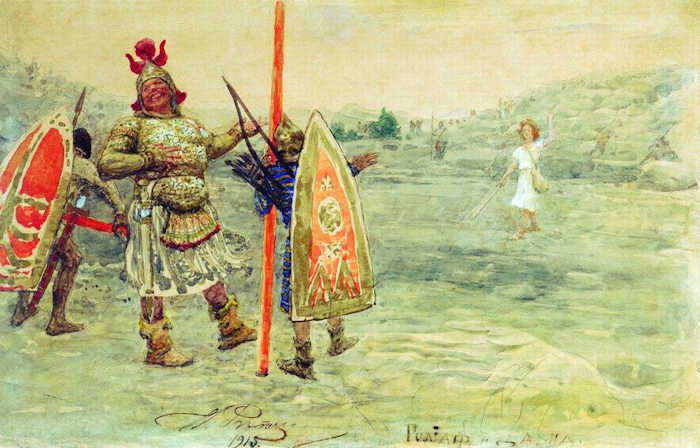|
 Explain
to your 'free-thinking' friend that he will need to serve as go-between
to establish communications between the aliens and yourself, inasmuch as, for some
reason, they don't visit you. Ask him to ask them what is their moral
status: are they like the righteous angels who never fell, like the
rebellious angels who fell without offer of restoration, like men,
fallen but redeemed, or like animals? Ask them if their planet is
studded with bill-boards reading 'Repent!' or only ads for casinos and
dirty movies. Your atheist friend will explain the conditions on their
planet in loving detail (they have their own religion; it involves mind-melds, etc.);
when you get to the part where you ask, 'How do you know any of this?'
perhaps you will be too kind to verbalize the inquiry. Explain
to your 'free-thinking' friend that he will need to serve as go-between
to establish communications between the aliens and yourself, inasmuch as, for some
reason, they don't visit you. Ask him to ask them what is their moral
status: are they like the righteous angels who never fell, like the
rebellious angels who fell without offer of restoration, like men,
fallen but redeemed, or like animals? Ask them if their planet is
studded with bill-boards reading 'Repent!' or only ads for casinos and
dirty movies. Your atheist friend will explain the conditions on their
planet in loving detail (they have their own religion; it involves mind-melds, etc.);
when you get to the part where you ask, 'How do you know any of this?'
perhaps you will be too kind to verbalize the inquiry.

Douglas Wilson
This pro-slavery Reformed author turns Hannah and Mary on their heads,
arguing that God is for the mighty and powerful, over against the
weak and helpless. God, it turns out, is a great proponent of
hierarchical social organization, including slavery. Douglas Wilson aspires to
learn from the antebellum South the values of "culture, order, hierarchy,
honor, and agrarianism" (Douglas Wilson, Black and Tan, Kindle
location 266). According to this author, the Southern cause in the
Civil War was righteous, and the North was simply evil:
"So I also take it as a given that the South was right
on all the essential constitutional and cultural issues surrounding
the war, and this is my reason for calling myself unreconstructed."
(Douglas Wilson, Black and Tan, Kindle location 266).
This author enthusiastically commends Robert Lewis Dabney, a rabid racist, for his
brilliant, and altogether successful, defense of the institution of
Southern slavery. However, realizing that Dabney, who likens Africans to
apes, may not be to everyone's taste, he hints at an alternative defense, which the
Southerners did not offer, but might have, had they been so fortunate as
to have him for their coach, whispering the successful strategy into their ear. Instead of racism,
which has fallen out of favor, they should have based their defense on
the cultural inferiority of Africans: "Both Northerners and Southerners
were misled by the obvious inferiority of black culture at that time. .
." (Douglas Wilson, Black and Tan, Kindle location 249).
However, had the Southerners picked up on this delayed hint thrown out via time machine, they
would have found themselves on nearly as much of a collision course with
the Bible as they did historically with their racism. What is the
evidence that God favors glittering and advanced cultures, like Babylon
and Egypt, over a small, wandering pastoral tribe with limited cultural
resources? Why is it called 'oppression' when these learned and accomplished cultures enslave the backwards little tribe? Unlike Douglas
Wilson, God does not despise the 'inferior;' woe to the 'superior' who
set themselves atop the social 'hierarchy.'
The social hierarchy of the Middle Ages was not only not
prescribed in the Bible, it would have been a criminal offense under
the Mosaic law: "Woe unto them that join house to house, that lay
field to field, till there be no place, that they may be placed
alone in the midst of the earth!" (Isaiah 5:8).
The idea that a small military elite ought, by right, to own all the
land is as foreign as foreign can be to the Bible. The land of
Israel was equitably divided on first possession, by lot, among the
people. As time went on, naturally more land accrued to the more
efficient producers; so to reverse that otherwise inevitable
development, a Jubilee was proclaimed at the fiftieth year, and the
land reverted to the original, inefficient owners. The medieval
system never rested on the consent of those on the bottom of the
social pyramid; when opportunity presented, as when the plague left
a shortage of laborers, they grabbed all they could get, as would
we. They never consented to their oppression nor loved their
masters. The system rested on force: “. . .Batholomew Anglicus, who
wrote presciently in the thirteenth century of the common folk:
''When they be not held low with dread, their hearts swell, and wax
stout and proud against the commandments of their sovereigns”
(Miller and Hatcher, Rural Society and Economic Change, pp.
xiii-xiv). (Hatcher, John. The Black Death: A
Personal History (p. 467). . It was only by force
that the peasants could be kept down. Once the Bible was translated
into the vernacular and they realized their oppression had no Bible
sanction, even force did not work any more
Whether the Southerners of the day would have been grateful upon
receipt of Mr. Wilson's gift of a new and improved pro-slavery argument is
doubtful. No one in the American South would have looked with
anything less than horror upon the prospect of a white, Christian,
Anglo-Saxon man being reduced to slavery; these people were proud of
their heritage, proud of the Magna Carta; they were slaves to no
one, they were free men. Slavery was for other people, not for them. They were
not looking for a race-neutral defense of slavery, and may not have
accepted one if offered. Mr. Wilson's proposal to retain their
conclusion, that slavery is morally benign, while removing its sole
foundation: racism,— the conclusion helpfully resting for a
moment aloft in mid-air, while the new and improved foundation is
fitted in,— would likely have gone over like a lead balloon. So Mr.
Wilson's proposed improved pro-slavery argument lacks a constituency, thankfully,
because neither Bible-believers nor antebellum Southerners have any
reason to embrace it.
The controversy between Mary's song and Calvinists goes back to
the founder, who just did not get it. How many times have we seen
the manger scene depicted in Christmas cards, and marvelled that the
God of the universe would condescend to be born in circumstances
even lower than commonplace poverty? Who has ever found it
disgusting? I remember as a small child hearing the song, 'Jesus our
brother, kind and good, was humbly born in a stable rude, and the
friendly beasts around him stood,' and thinking it beautiful, though not raised as a Christian. Who
has ever thought, how revolting? One man: "And found Mary. This
was a revolting sight, and was sufficient of itself to produce an
aversion to Christ. For what could be more improbable than to
believe that he was the King of the whole people, who was deemed
unworthy to be ranked with the lowest of the multitude? or to expect
the restoration of the kingdom and salvation from him, whose poverty
and want were such, that he was thrown into a stable?" (John Calvin,
Harmony of the Gospels, Volume 1, Heritage Library, p. 120). One
prissy, snobbish, cold and arrogant man, lacking in empathy. And
thus was born a theology, which reasons thus: God says that He
chooses the poor over the rich, the weak over the strong, but
nobody could possibly really do that because the poor are contemptible. Therefore the true basis of His choice is inscrutable,
hidden from our view:

|












